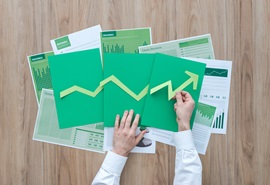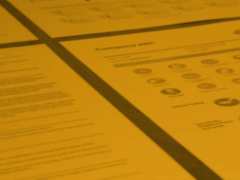Financing the Future: An Interview on How Banks are Embarking on Their ESG Journeys
Financing the Future: Conversations in Sustainable Finance is a Q&A series where we sit down with featured ESG experts from Sustainalytics, sharing their insights on how businesses are using finance to meet the challenges of our transition to a sustainable future.
Infographic | How Today’s Banks are Adopting ESG-Based Strategies to Become More Sustainable
Banks need comprehensive and credible environmental, social, and governance (ESG) strategies to participate in and benefit from the accelerating growth of sustainable finance. This infographic sheds light on some of the key sustainability-focused strategies banks are using and what they might look like in practice.
Financing the Future: An Interview on Banks’ Role in the Green Transition
Financing the Future: Conversations in Sustainable Finance is a Q&A series where we sit down with featured ESG experts from Sustainalytics, sharing their insights on how businesses are using finance to meet the challenges of our transition to a sustainable future. Read on to learn...
Sustainable Finance and Banks: Reduced Risk, Increased Opportunity
Banks will play a key role in the green transition and those that commit to sustainable banking may gain an advantage over competitors, among other benefits. Indeed, banks are uniquely positioned to participate in and benefit from the transition to a green economy.
ESG Investors Consider Socioeconomic Impacts of COVID-19 in the Construction Industry
The construction industry can have a reputation for workforce insensitivity and is highly vulnerable to economic and social variabilities. The ESG Impacts of COVID-19 drive companies to adapt to significant challenges related to the demand for construction services. This construction sector research snapshot highlights relevant social issues that corporations face due to ripple effects from the pandemic using Sustainalytics’ ESG Risk Ratings and Controversies Research.
Delays, Questions and Confusion: Updates on the EU’s Sustainable Finance Disclosure Regulation
In this blog, we look at the delay of the level 2 regulation, some aspects of the Q&A, and the ongoing confusion and divergence around SFDR. We pay special attention to the potential impact of the Principle Adverse Impact indicators, an element of SFDR.
Financing Sustainability: Recent Trends in Sustainable Bonds, Linked Instruments and Disclosure
The “Financing Sustainability: Recent Trends in Sustainable Bonds, Linked Instrument and Disclosure” ebook shares insights on recent progress made by organizations bridging the gap between sustainability and finance.
ESG Risk Exposure from COVID-19 Vaccine Transportation and Distribution
As mass vaccination against the coronavirus started, a key challenge has been to keep millions of doses of vaccines at the right temperature. An increase in temperature inside a truck or aircraft, by half a degree, for half an hour, would reportedly result in a 'defrosted' vaccine which has then to be discarded.
Sustainability-Linked Loans 2021: The COVID-19 Effect, ESG Ratings & Continued Popularity
The sustainable finance market has seen an exponential increase in size and activity in recent years. Innovative offerings such as green, social, and sustainable bonds, green and sustainability-linked loans (SLLs), and most recently sustainability-linked bonds, have contributed to the market’s incredible growth. In 2020, boosted by varied financial needs and mainstream recognition of environmental, social and governance (ESG) parameters, global sustainable debt capital surpassed US$700 billion, a 30% increase compared to 2019. Part of this capital was channelled towards tackling the effects of COVID-19 as government agencies, supranational bodies and corporates borrowed money to support areas most affected by the pandemic, such as healthcare. This shift in fund usage in 2020 resulted in the rapid growth of social bonds and a commendable first year for sustainability-linked bonds.
Corporate ESG in Focus: An Overview of ESG and its Impact on Companies
With climate change and social justice concerns increasingly dominating headlines, environmental, social, and corporate governance (ESG) factors are no longer treated as trivial issues confined to a company’s CSR department. ESG is now central to a company’s financial performance and reputation.
Combining ESG Risk and Economic Moat
In this report, we look at the potential synergies between Sustainalytics’ ESG Risk Ratings and Morningstar’s Economic Moat Rating. As a part of our research, we constructed a back-testable investment strategy and portfolio by segmenting stocks with low ESG risk and a wide moat. While both metrics worked independently, they performed exceptionally well in combination.
ESG Risk Ratings Methodology
The ESG Risk Ratings measure the degree to which a company’s economic value is at risk driven by ESG factors or, more technically speaking, the magnitude of a company’s unmanaged ESG risks. A company’s ESG Risk Rating is comprised of a quantitative score and a risk category.




















